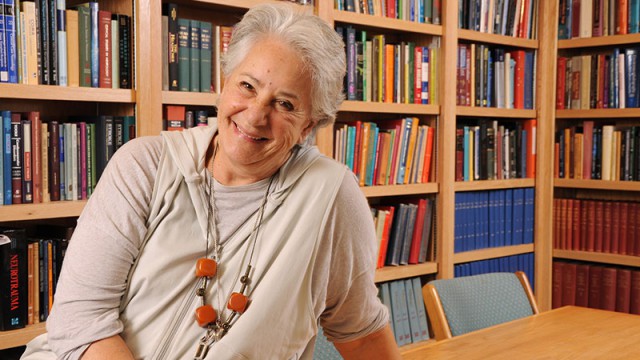Gift honors multiple sclerosis researcher and clinician and creates medical school professorship
Hanover, NH—A generous gift to Dartmouth's Geisel School of Medicine from the family of Murray B. Bornstein, MD (DC '39), will establish a neurology professorship in his name. Bornstein was a renowned clinician and researcher in the field of multiple sclerosis and a former adjunct professor at the school. He is best known for pioneering a tissue-culture technique for diseases of the central nervous system and for leading several exemplary clinical trials for multiple sclerosis treatment. His work continues to benefit patients, as he was integral in the testing and approval of glatiramer acetate (GA), the most commonly used drug for treating multiple sclerosis in the U.S.

"Murray Bornstein was a remarkable researcher and physician whose legacy lives on in the many patients who continue to benefit from his work," says Chip Souba, MD, dean of the Geisel School of Medicine at Dartmouth. "This generous gift from the Bornstein family honors his compassionate care and commitment to research, and it also boosts our work to discover new answers to challenging neurological conditions, and improve lives."
"It means so much to me to honor Murray in this way," says Selma Bornstein, who was married to Murray Bornstein for nearly 40 years until his death in 1995. The couple had five children—Joshua, Mimi, David, Judith, and Daniel—who have joined with their mother to establish the professorship.
The Murray B. Bornstein Professorship will be awarded to a clinician in Geisel's Department of Neurology who conducts research in progressive, disabling neurological diseases, preferably multiple sclerosis. With fierce competition among top medical schools for talented physician-researchers, endowed professorships serve as powerful recruitment and retention tools. Professorships afford faculty the flexibility to pursue their passions in research and education, strengthening a particular area of research within a department and expanding mentoring opportunities for students and trainees. Increasing the number of endowed professorships is a top fundraising priority for the Geisel School of Medicine.
"This professorship honors the important translational research that Murray Bornstein conducted in the development of effective treatments for people with multiple sclerosis, and it will allow us to advance such important work, here, at the Geisel School," says Jeffrey Cohen, MD, interim chair of the Department of Neurology.
Bornstein "was a man of great compassion and ebullience, who cared deeply for his colleagues and his patients, and always gave generously of himself," wrote Stanley H. Appel, MD, in a dedication to Bornstein in volume 16 of the book Current Neurology. Bornstein "combined the elegance of the scientist with the warmth and dedication of the humanist," added Appel, who described Bornstein as a mentor and a friend.
After graduating from Dartmouth in 1939, Bornstein earned an MS from McGill University in Montreal and an MD from the University of Geneva, Switzerland. He did his clinical and research training in neurology at Mount Sinai School of Medicine and Columbia University. In 1966, Bornstein joined the faculty at Albert Einstein College of Medicine, where he "established a world-renowned tissue culture facility and provided the neuroscience community-at-large an international training ground," according to Cedric Raine, PhD., DSc., a longtime colleague who paid tribute to Bornstein in a journal article after his death. When Murray and Selma Bornstein moved to Norwich, Vt, in 1994, Bornstein became an adjunct professor of medicine at Dartmouth's medical school.

"I give to carry on Murray's commitment to science, learning, and the compassionate care of patients," says Mrs. Bornstein. She sees the same commitment in Geisel's Department of Neurology, which she has supported for 16 years. Mrs. Bornstein's previous gifts have provided for the purchase of the latest neurology journals and textbooks for the department's library; opportunities for residents and fellows to attend professional conferences; partial support for a research fellowship in multiple sclerosis and other progressive, disabling neurological diseases; and the annual Murray B. Bornstein Lectureship, a grand rounds lecture for a distinguished scholar-physician in neuroimmunology. Mrs. Bornstein has also provided salary support for a full-time nurse in the department's multiple sclerosis clinic.
"Endowing this professorship is a profound experience for me," says Mrs. Bornstein, "because it establishes an enduring legacy for Murray and makes it easier for future researchers to make important discoveries about a disease to which Murray dedicated his life and work in search of the cause and a cure."
For more on Murray Bornstein and Mrs. Bornstein's support of neurology research, education, and patient care, read "Sixteen years of giving benefits MS research, trainees, and patients."
# # #